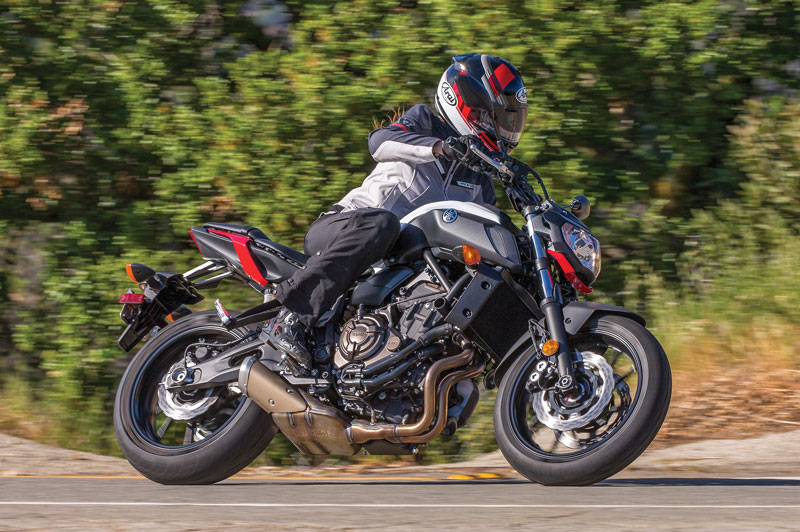
We’ve been smitten with the Yamaha FZ-07 since it was introduced in 2014 as a 2015 model: it’s fun, inexpensive and has a lot of character for what some would consider a novice- or intermediate-level bike.
We’re not the only ones—Yamaha USA says the FZ-07 was its number one-selling bike in 2017, and that more than 15,000 were sold from June 2014 through December 2017.
Read our comparo review pitting the FZ-07 against the Kawasaki Ninja 650 and Suzuki SV650.
Naked sportbikes in general are becoming more popular as casual riders abandon the ultra-aggressive posture, power and price of pure sportbikes in favor of naked versions that deliver 80 percent of the performance along with real-world comfort and a lower price tag.
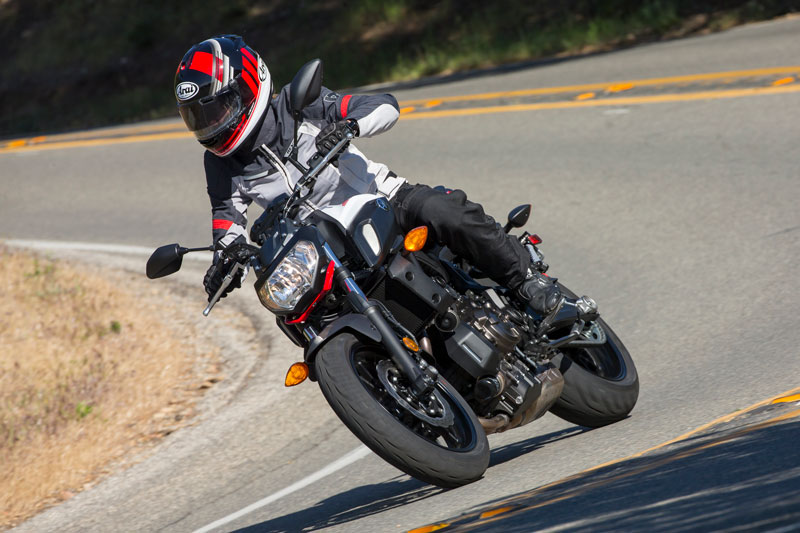
Jenny’s Gear
Helmet: Arai DT-X
Jacket: Rev’It Airwave 2
Pants: Joe Rocket Alter Ego
Boots: Sidi Vertigo Lei
For 2018, the FZ-07 gets a new name—MT-07—and a light restyle, including revised suspension that is stiffer and employs more compression and rebound damping, a roomier rider and passenger seat (seat height remains the same at 31.7 inches), a redesigned tank cover, a new headlight, front turn signals relocated to just above the redesigned radiator cover, a restyled tail with new LED light, and standard ABS (formerly a $500 option).
The “MT,” by the way, stands for “Master of Torque,” a nomenclature ostensibly derived from the MT-01 muscle bike (not sold in the U.S.), but as EIC Tuttle discovered it also happens to be the title of an anime series produced by Yamaha in Japan.
The first episode is called “Idle Roughness.” We kid you not.
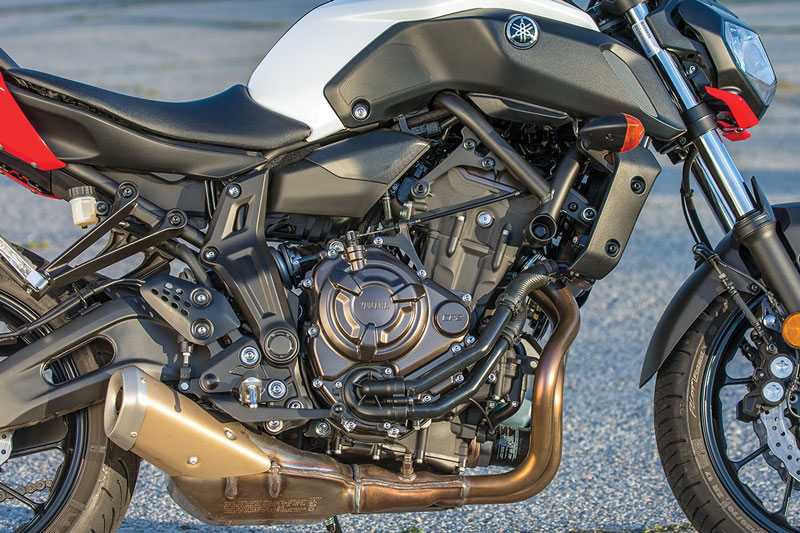
Unchanged are the tubular steel frame and, thankfully, the feisty CP2 (Crossplane Concept) engine, a 689cc, DOHC, 8-valve parallel twin with an uneven 270-degree firing interval for character enhancement and a boost in low-to-midrange power. Its two cylinders are offset 7mm, a design borrowed from the YZR-M1 MotoGP racebike and the FZ/MT-09, reducing cylinder-to-piston friction and horsepower loss and increasing fuel efficiency.
From the rider’s seat, the bike feels rambunctious, light and fun—even more fun perhaps than its more powerful MT-09 brother. With almost 69 rear-wheel horsepower and 48 lb-ft of torque per the Jett Tuning dyno, the 403-pound MT-07 punches above its weight, yet matches its sting with butterfly handling: nimble and confident.
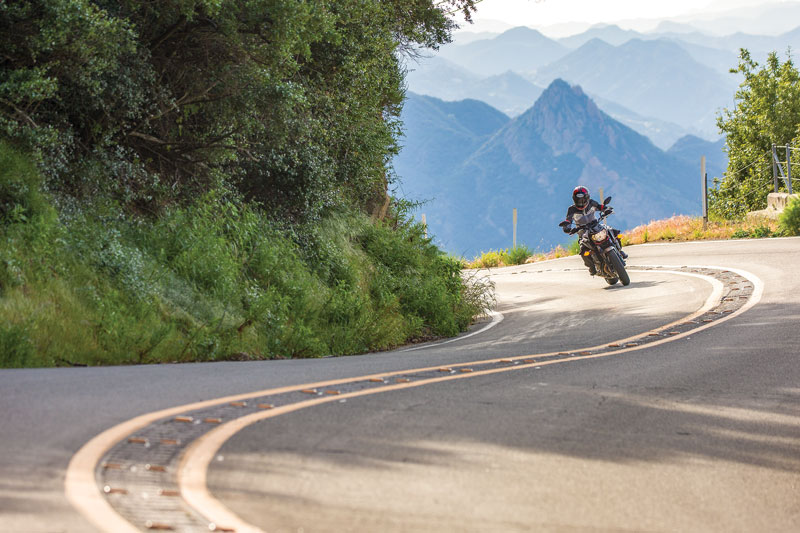
Our First Ride was a washout, so we’ve been anxiously awaiting a second round with this featherweight champ, and fortunately the SoCal spring weather proved to be more reliable than a Spanish winter.
After spending time on our XSR700 test bike, which shares the MT-07’s frame, engine and suspension settings, I was reminded that the MT is much more sporty. Its narrow bar and higher footpegs perch this 5-foot, 9-inch rider in a comfortable attack mode, which means those with a larger, wider frame might feel a bit cramped.
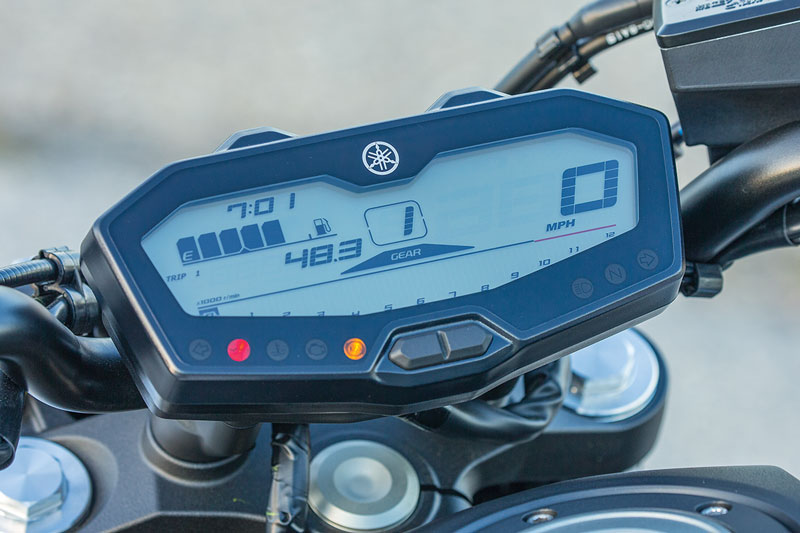
Not that you’ll notice once you hit the twisties with the parallel twin howling, as the MT does your bidding almost telepathically. The new suspension settings are certainly more favorable to larger and/or aggressive riders; the 41mm KYB fork has the same 5.1 inches of travel, but is now 6 percent stiffer with a 16-percent increase in rebound damping.
The rear KYB shock, which bolts directly to the engine, is 11 percent stiffer, with a 27-percent increase in high-speed rebound damping and a whopping 40-percent increase in high-speed compression damping. In addition to preload adjustment, which thanks to a redesigned side cover is easier to access, it also features rebound adjustment à la the MT-09.
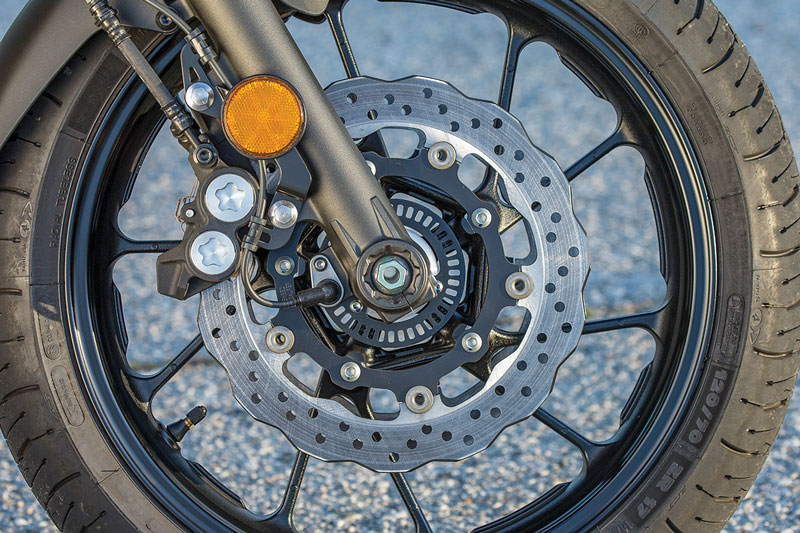
The stiffer underpinnings result in a more jarring ride for me, but on smooth, twisting pavement it’s better, especially when negotiating the sometimes steep downhill switchbacks in our local canyons. The brakes are as good as ever, and the dual 282mm floating front discs with opposed 4-piston calipers and single rear 245mm disc with 1-piston caliper are now equipped with ABS as standard.
The MT-07’s flatter, roomier seat is easier to move around on, great for both hanging off in corners or readjusting on long commutes. Tail bag attachment points are unfortunately minimal, although there are four loops tucked under the pillion seat for small bags, and a magnetic tankbag won’t work on the plastic covers.
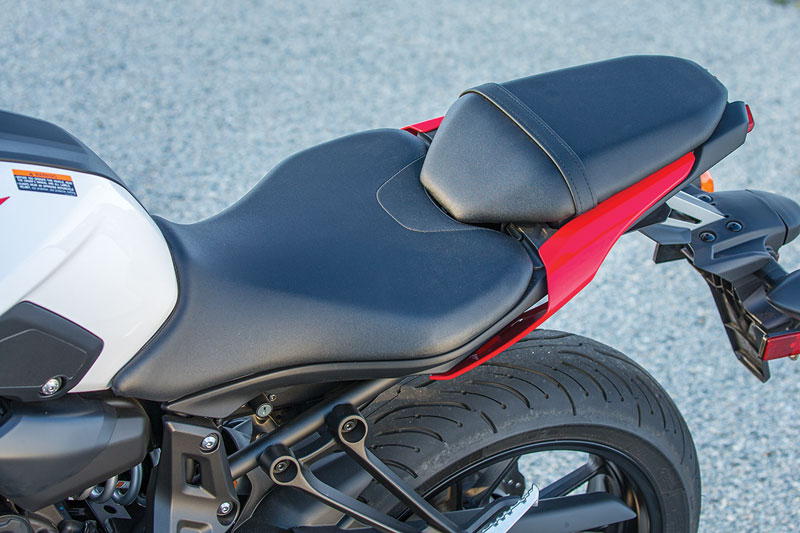
My other niggles include the fact that the entire LCD instrument is blocked by my helmet’s chinbar, forcing me to drop my head to grab a glance—not a big deal unless you’re negotiating traffic or twisties, where milliseconds count. Also the clutch is a tad snatchy, especially at higher rpm, requiring deft downshift “blipping”; if Yamaha were to give it a slipper clutch the MT-07 would be even more approachable.
Otherwise, this “Master of Fun” is still undoubtedly one of the best bang-for-the-buck rides out there, and it’s easy to see why the MT-07 has become Yamaha’s bestseller. For 2018, it’s available in three colors, Team Yamaha Blue, Matte Gray and Intensity White, for $7,599.
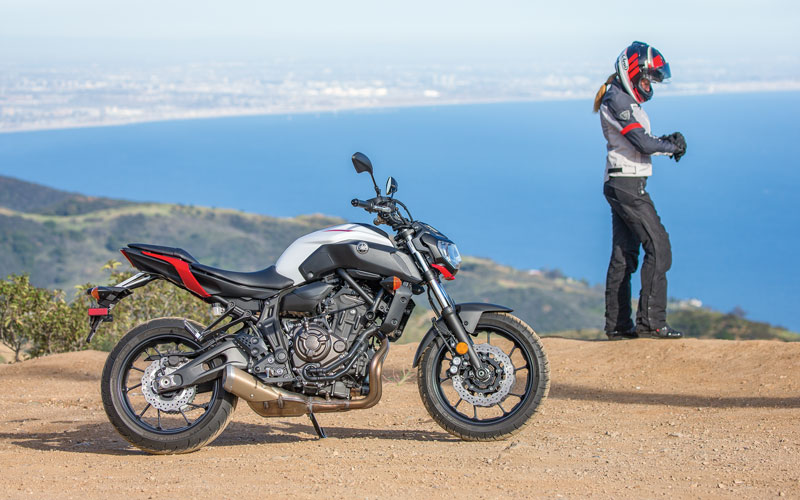
2018 Yamaha MT-07 Specs
Base Price: $7,599
Warranty: 1 yr., unltd. miles
Website: yamahamotorsports.com
Engine
Type: Liquid-cooled, transverse parallel twin
Displacement: 689cc
Bore x Stroke: 80.0 x 68.6mm
Compression Ratio: 11.5:1
Valve Train: DOHC, 4 valves per cyl.
Valve Insp. Interval: 26,600 miles
Fuel Delivery: DFI w/ 38mm throttle bodies x 2
Lubrication System: Wet sump, 2.75-qt. cap.
Transmission: 6-speed, cable-actuated wet clutch
Final Drive: O-ring chain
Electrical
Ignition: Electronic
Charging Output: 410 watts max.
Battery: 12V 8.6AH
Chassis
Frame: High-tensile tubular steel, steel beam-type swingarm
Wheelbase: 55.1 in.
Rake/Trail: 24.8 degrees/3.5 in.
Seat Height: 31.7 in.
Suspension, Front: 41mm fork, no adj., 5.1-in. travel
Rear: Single link-type shock, adj. for preload and rebound damping, 5.1-in. travel
Brakes, Front: Dual 282mm floating discs w/ opposed 4-piston calipers & ABS
Rear: Single 245mm disc w/ 1-piston floating caliper & ABS
Wheels, Front: Cast, 3.50 x 17 in.
Rear: Cast, 5.50 x 17 in.
Tires, Front: 120/70-ZR17
Rear: 180/55-ZR17
Wet Weight: 403 lbs.
Load Capacity: 380 lbs.
GVWR: 783 lbs.
Performance
Fuel Capacity: 3.7 gals., last 0.7 gal. warning light on
MPG: 86 PON min. (low/avg/high) 53.4/57.6/62.4
Estimated Range: 213 miles
Indicated RPM at 60 MPH: 4,100








Can you give more details on the handling? How does it do on curves at speed when the road gets rough?